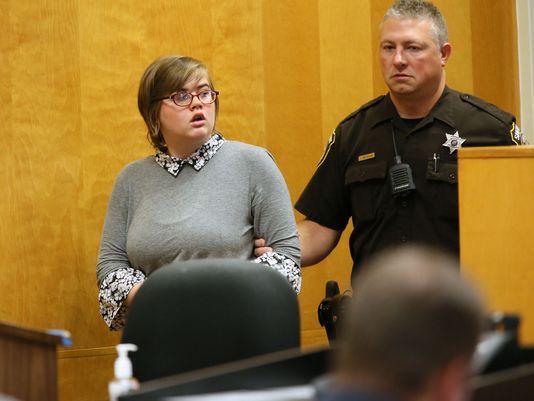WAUKESHA - Prosecutors in the Slender Man stabbing have reached a plea agreement that will avoid a trial for the second girl charged in the case.
Morgan Geyser, 15, was scheduled to go before a jury next month, but will instead plead guilty as charged but not be held criminally liable and remain at the state mental hospital where she has been getting treatment for about 18 months.
The deal essentially will end the three-year-old case that has made news nationally.
The resolution, revealed at a status hearing Friday, was not unexpected. On Sept. 15, a jury found Geyser’s co-defendant, Anissa Weier, not guilty by reason of mental disease or defect, and she was not as clearly ill as Geyser.
Geyser appeared with one of her attorneys, Donna Kuchler, who later said her client has "made incredible strides" since beginning institutionalized treatment. She said there would be more discussion of Geyser's situation after she formally pleads guilty on Thursday.
In exchange for her guilty plea to the attempted first-degree intentional homicide, prosecutors dropped an enhancer for use of a dangerous weapon, which cuts five years from her potential maximum commitment, and will agree that she meets the standard for being found not guilty by mental disease.
Kuchler called the case a tragedy for everyone. "Our hearts go out to the victim and her family," she said, while noting the plea saves everyone a trial.
The victim's family was in court for the brief hearing but declined comment afterward.

Three psychologists, two of them appointed by the court, all agreed Weier came to share a delusion with Geyser that Slender Man, an internet character, would kill them or their families if they didn’t carry out their plot to kill their sixth-grade classmate.
The girls were 12 at the time but charged as adults, as required under Wisconsin law because of the severity of the crime — attempted first-degree intentional homicide. During early evaluations of the girls' legal competency to understand the charges and aid in their defense, Geyser was diagnosed with early-onset schizophrenia.
Prosecutors fought defense lawyers’ extensive efforts to have the cases transferred to juvenile court, and both the judge and the Court of Appeals denied the so-called reverse waiver.
Last year, the girls entered insanity pleas.
Despite her diagnosis, Geyser wasn't treated for more than a year until she was committed under a separate civil procedure before a different judge.
Before her penalty phase trial, Weier pleaded guilty to attempted second-degree intentional homicide with a deadly weapon. That reduced the potential maximum prison sentence from 45 years to 25 years.
Weier agreed that if found not guilty by mental disease or defect, she would not seek release from treatment for three years. Prosecutors agreed that if jurors rejected her plea, they would recommend a 10-year prison sentence.
At the time, Geyser’s attorney suggested that the only plea that made sense for his client would be one that included a stipulation that her mental condition at the time prevented her from being found criminally responsible.
Weier's lawyers had the burden to prove that the defense applied to her by a preponderance of the evidence. Prosecutors presented no evidence at Weier's trial and argued that Weier's real motive was to keep Geyser's friendship, not a true fear of Slender Man's wrath. They argued Weier knew the stabbing was wrong because she declined twice to do it herself. Geyser ultimately inflicted the wounds, at Weier's urging.
A jury deliberated about 12 hours before finding, 10-2, that Weier suffered from a mental condition that prevented her from understanding her actions were wrong or prevented her from conforming them to the law.
Without the plea deal, Geyser could have forced prosecutors to prove the facts of the case. That could have led to testimony by the victim, Payton Leutner, or at least the playing of her recorded interview with police days after she had survived multiple surgeries for the 19 stab wounds suffered in the May 31, 2014, attack in woods near a Waukesha park.
And at a penalty phase, Geyser's attorneys would have introduced evidence that before she began treatment, she told doctors she still had conversations with characters from the Harry Potter stories, could exercise Vulcan mind control and couldn’t guarantee she wouldn’t follow more Slender Man commands.
Jurors may also have heard that at a West Bend juvenile jail she ate under a table and played with ants. On the recording of her interrogation the day of her arrest, Geyser stared into space, sang and sat with her feet up on the chair, exhibiting no sense of emotion as she discussed the day's events.
Since moving to Winnebago Mental Health Institute in Oshkosh, Geyser has begun medication and therapy her lawyer has said successfully ended her hallucinations.
At more recent court appearances, she appeared more focused but sad and sometimes dull from drugs.
Lawyer Anthony Cotton said though his client is healthier now and her improved mental health makes her able to comprehend what she did and her own situation.


